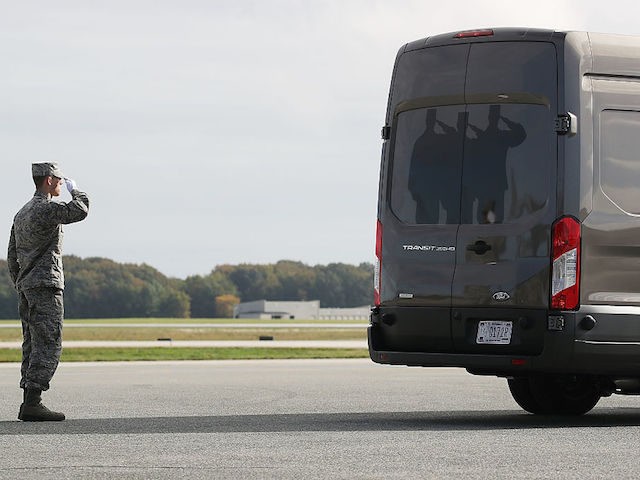Being a member of the Taliban is not a justification for U.S. troops to attack a terrorist in Afghanistan, even as the terrorist group expands its territorial control across the war-ravaged nation and security conditions continue to deteriorate.
A top spokesman of the U.S.-NATO mission in the country confirmed that the rules of engagement forbid this to Breitbart News.
In an exclusive statement, American Brig. Gen. Charles Cleveland, the U.S.-NATO mission’s deputy chief of Staff for communication, explained that U.S. troops can only attack the Taliban in self-defense and when assisting Afghan National Defense and Security Forces (ANDSF) during combat.
Cleveland did not dispute the notion that American troops have to wait to be shot at first before they can attack the Taliban.
“Our authorities do not authorize the targeting of Taliban forces by status. Because U.S. Forces have always had the self-defense authority, U.S. forces can always defend themselves and engage any element that poses an identified threat,” the brigadier general told Breitbart News.
Last Friday, Cleveland declared that the ultimate goal of the war in Afghanistan is not the defeat of the Taliban, but rather a “negotiated solution with the Taliban.”
Although U.S. troops and military aircraft are allowed to attack jihadists from al-Qaeda and the local Islamic State branch, the rules of engagement (ROE) when fighting the Taliban are different. The Taliban is the largest and strongest jihadist group in Afghanistan. It controls more territory than any of the many other terrorist groups operating in the region.
According to various assessments, security conditions are getting worse, primarily due to the resilient Taliban.
Nevertheless, American forces are only able to carry out operations against the Taliban when U.S. or coalition forces are under direct threat; when U.S. officials determine that the Taliban is providing direct support to al Qaeda; or when the Taliban pose a ‘strategic threat’ to ANDSF troops, which includes military and police units, explained the Wall Street Journal (WSJ) earlier this year.
Cleveland’s statement came in response to Breitbart News asking the top spokesman to elaborate on what he told Pentagon reporters last Friday.
Echoing a top U.S. general who is now retired, he indicated that the U.S. military is not able to target Taliban jihadists for “just being members of the Taliban.”
“Our first authority is always force protection. So we’re able to, you know, defend ourselves and use fire to do so,” explained the brigadier general.
Some months before retiring and leaving his post as top commander of U.S. and NATO forces, American Gen. John Campbell revealed to lawmakers that the United States military lost the authority to offensively attack the Taliban when President Barack Obama declared the U.S. combat mission over at the end of 2014.
“To attack the Taliban just because they’re Taliban, I do not have that authority,” said the top U.S. general at the beginning of February.
Before retiring, Gen. Campbell reportedly asked President Obama to once again allow the American troops to offensively attack the Taliban, but his request fell on deaf ears.
U.S. troops – including Campbell’s successor as top commander in Afghanistan, Gen. John Nicholson – have tried to persuade their commander-in-chief to resume the American military’s authority to carry out offensive operations against the Afghan Taliban, but have seemingly failed.
In June, President Barack Obama did grant new authorities to the U.S. military that deceptively appeared to have resulted in American troops being able to once again go on the offensive when fighting the Taliban.
“The president of the United States provided new authorities to allow U.S. forces to help our Afghan partners achieve their overall strategic campaign plan,” said Cleveland. “These new authorities allow for the use of combat enablers, including fire support, to help the Afghans accomplish their strategic goals.”
After the Obama administration announced the new authorities, Cmdr. Nicholson told reporters that the former rules of engagement limited the U.S. military to respond to threats in “a defensive, reactive kind of manner.”
“Now, with the new authorities that we have now, as of June, we’re able to then provide combat enablers to assist the Afghans who are now… taking the initiative against the enemy… so it’s more of an offensive nature to that operation that we’re assisting,” Nicholson added.
However, U.S. troops remain limited in how they can protect themselves from the Taliban.
Some American service members have denounced the current ROEs in Afghanistan, saying it is unclear when it is acceptable to shoot at the Taliban and the measures allow lawyers to dictate when military force is justified.
In a sworn statement that was part of a declassified, heavily redacted Pentagon report released earlier this year, an unnamed Green Beret who served in Afghanistan, citing the rules of engagement, said the 15-year-old war effort in the country suffers from “moral cowardice” and a “profound lack of strategy.”

COMMENTS
Please let us know if you're having issues with commenting.